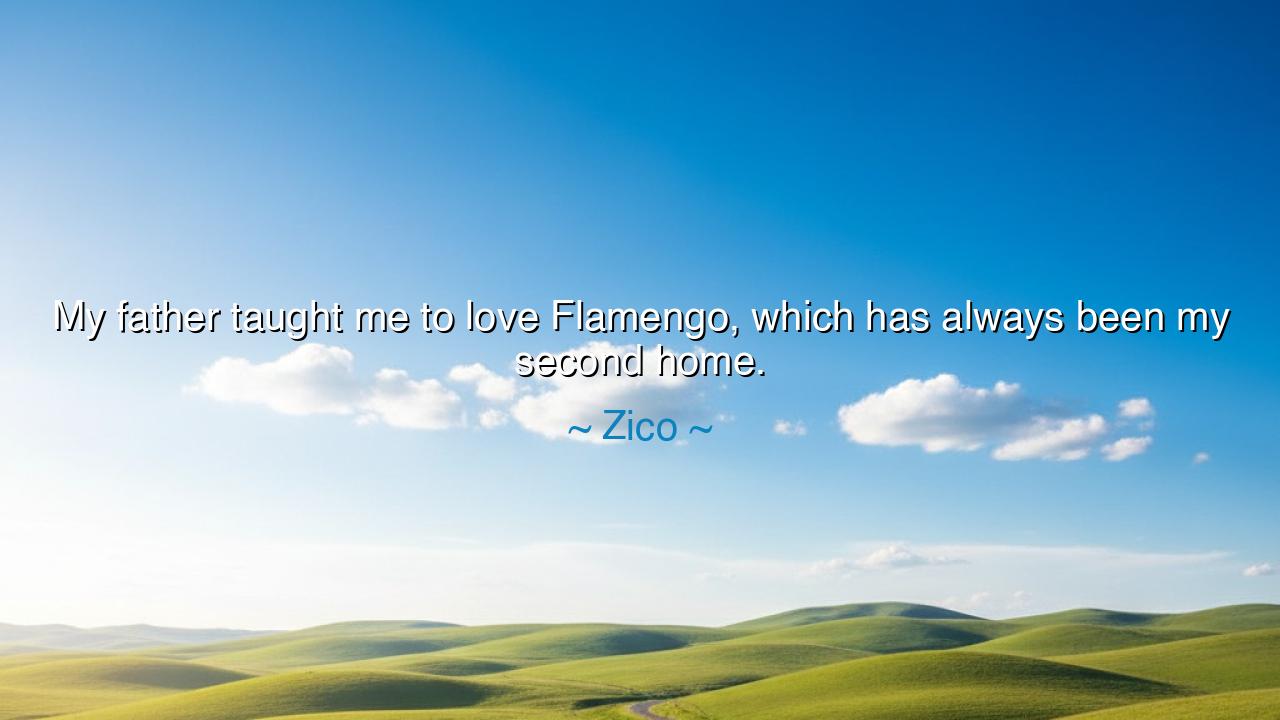
My father taught me to love Flamengo, which has always been my






In the ledger of inheritances—where some receive land and some receive a song—one line is written with a striker’s certainty: “My father taught me to love Flamengo, which has always been my second home.” So speaks Zico, and his words sound like a hymn carried across a crowded terrace. Beneath their simplicity lies an old covenant: that a father passes more than a surname; he passes a banner, a way of standing in the world, a door into a house made not of brick but of voices, colors, and memory. To love Flamengo is to learn a grammar of belonging in red and black, a catechism spoken in chants and shared breath.
The meaning glows at the hearth of family. A father points and says, “Look—this is ours,” and the child learns to see. First comes love, then comes lore: nicknames murmured like prayers, the smell of rain over the Maracanã, names of heroes recited as if they were uncles. The club becomes a second home not because it shelters from weather, but because it shelters from loneliness. In that house, grief is halved and joy is multiplied; there a child discovers that passion—disciplined by respect—can shape a life as surely as study or labor.
The origin of such a confession is carved in matches and mornings. Flamengo is not merely a badge; it is a school of character: toil at Gávea, courage before vast crowds, humility after triumph, and faith after defeat. For Zico, the path wound from street pitches to the world’s great stages, but the first coach’s whistle was his father’s voice. To say the club is a second home is to acknowledge the corridor you never stop walking: from family kitchen to locker room, from childhood seats to captaincy, from the private vow to the public shirt.
Take also a story from the book of days when Rio’s sky burned bright. In 1981, Flamengo strode through the continent and across the ocean, lifting the Copa Libertadores and then mastering Liverpool in Tokyo with the calm of a team that knew its own name. The scoreboard told one tale; the aftermath told another: families in distant neighborhoods wept and sang; fathers lifted children on shoulders and said, “Remember this.” A club’s victory became a city’s mirror; a child’s love became a citizen’s pride. History, like football, is scored in moments—but it is lived in the long echo that follows.
Nor is this story only for the famous. Picture a boy and his father climbing the steps of the Maracanã, paper tickets soft with sweat. They share a borrowed radio, a bag of oranges, and a ritual: the same row, the same jokes, the same blessing—“Vai dar certo.” Years later, the boy returns as a man with his own child; the seats are new, the chants have changed, but the rhythm of home is the same. In that passing of place, we see why second homes endure: they let us keep faith with the dead while making room for the unborn.
What, then, shall we teach from this line? That love taught well becomes legacy; that a second home can steady the heart when the first grows quiet; that devotion to a club—held with honor—can train the virtues needed everywhere else: loyalty, patience, resilience, gratitude. Heroes retire, boards rotate, eras rise and fall; what remains is the craft of belonging—showing up, singing together, carrying one another through the lean seasons.
Take these counsels for your own road. (1) Tend your first home and your second home alike: bring respect to the stadium as you do to the table. (2) Learn the stories—players, matches, chants—and tell them to a younger voice; make memory a living fire. (3) Let rivalry sharpen joy, not poison it; honor opponents as you honor the game. (4) Serve where you stand: volunteer with the club’s community work, mentor a junior, share your ticket when you cannot attend. (5) When victory comes, celebrate without arrogance; when defeat comes, keep faith without bitterness. Do these, and the banner a father placed in your hands will not fray but brighten; your love will grow large enough to make room for others; and your second home will feel, in the best hours, indistinguishable from the first.






AAdministratorAdministrator
Welcome, honored guests. Please leave a comment, we will respond soon